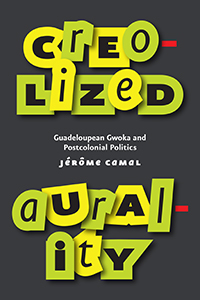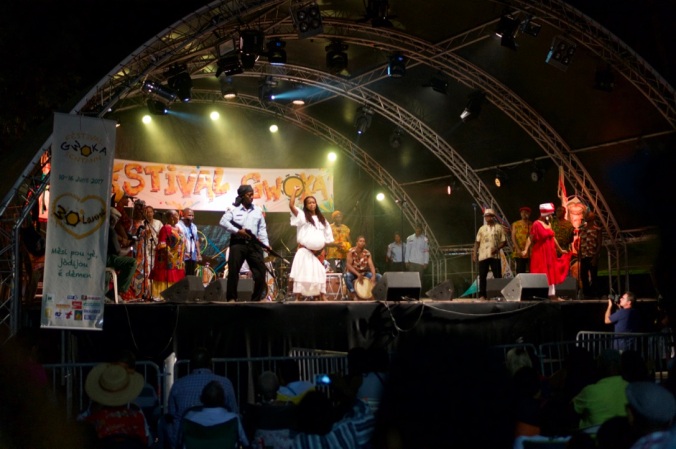 In the Caribbean island of Guadeloupe, the complex interplay between anticolonial resistance and accommodation resounds in its music. Guadeloupean gwoka music—a secular, drum-based tradition—captures the entangled histories of French colonization, movements against it, and the uneasy process of the island’s decolonization as an overseas territory of France. In Creolized Aurality, Jérôme Camal demonstrates that musical sounds and practices express the multiple—and often seemingly contradictory—cultural belongings and political longings that characterize postcoloniality. While gwoka has been associated with anti-colonial activism since the 1960s, in more recent years it has provided a platform for a cohort of younger musicians to express pan-Caribbean and diasporic solidarities. This generation of musicians even worked through the French state to gain UNESCO heritage status for their art. These gwoka practices, Camal argues, are “creolized auralities”—expressions of a culture both of and against French coloniality and postcoloniality.
In the Caribbean island of Guadeloupe, the complex interplay between anticolonial resistance and accommodation resounds in its music. Guadeloupean gwoka music—a secular, drum-based tradition—captures the entangled histories of French colonization, movements against it, and the uneasy process of the island’s decolonization as an overseas territory of France. In Creolized Aurality, Jérôme Camal demonstrates that musical sounds and practices express the multiple—and often seemingly contradictory—cultural belongings and political longings that characterize postcoloniality. While gwoka has been associated with anti-colonial activism since the 1960s, in more recent years it has provided a platform for a cohort of younger musicians to express pan-Caribbean and diasporic solidarities. This generation of musicians even worked through the French state to gain UNESCO heritage status for their art. These gwoka practices, Camal argues, are “creolized auralities”—expressions of a culture both of and against French coloniality and postcoloniality.
(Buy the book here.)
Words cannot do justice to the vibrancy of gwoka. Below are photographs, videos, and musical excerpts do help readers experience the richness of gwoka’s creolized aurality.
Introduction
Listening for (Post)Colonial Entanglements
Dominik Coco, “Mwen sé gwadloupéyen” (excerpt), from Lèspri Kaskòd (2008)
Statue of Solitude, Les Abymes (Photo by Jérôme Camal)

Léwòz, Baillif, July 2017 (Video by Raphaëlle Rabanes)
Chapter 1
The Poetics of Colonial Aurality
Indestwas Ka, Festival Gwoka, Sainte-Anne, July 2017 (Photo by Jérôme Camal)

Chapter 2
Building an Anticolonial Aurality: Gwoka Modènn as Counterpoetics
Cover of the Rapport culturel, AGEG (1970)

Gérard Lockel, “Léwoz, Mode No. 4” (excerpt) from Gwo Ka Modènn en Concert
Gwoka Modènn workshop, “Fò zòt savé,” Baie Mahault, July 2017 (Video by Raphaëlle Rabanes)
Chapter 3
Discrepant Creolizations: Music and the Limits of Hospitality
Erick Cosaque and X7 Nouvelle Dimension, “A koz don biyé san fwan” (excerpt), from Musique, Voix, Percussion
Guy Konket, “Lapli-la tonbé” (excerpts), from Vélo & Guy Conquête
Guy Konket and Emilien Antile, “Faya faya” (excerpt) from Patrimwan, Volume 1.
Guy Konket et le Groupe Ka, “YouYou” (excerpt)
Tumblack, “Caraïba” (excerpt), from Tumblack (1978)
Chapter 4
Diasporic or Creole Aurality? Aesthetics and Politics across the Abyss
Franck Nicolas in concert, Sainte-Anne, July 2017 (photo by Jérôme Camal)

David Murray and the Gwo Ka Masters, featuring Guy Konket, “On jou matin” (excerpt) from Yonn-dé (2000)
David Murray and the Gwo Ka Masters, featuring Guy Konket, “YouYou” (excerpt) from Yonn-dé (2000)
David Murray and the Gwo Ka Masters, featuring Sista Kees and Taj Mahal, “Southern Skies” (excerpt) from The Devil Tried to Kill Me (2009)
Jacques Schwarz-Bart, “André” from Abyss (2008)
Jacques Schwarz-Bart, “Simone” from Abyss (2008)
Jacques Schwarz-Bart performing with Jazz Racine Haiti in Junas, France, 21 July 2016 (photo by Jérôme Camal)

Chapter 5
Postnational Aurality: Institutional Detour and the Creolization of Sovereignty
Coda
Bigidi
Dancer during the léwòz of the Festival Gwoka, Sainte-Anne, 10 July 2010 (photo by Jérôme Camal)
